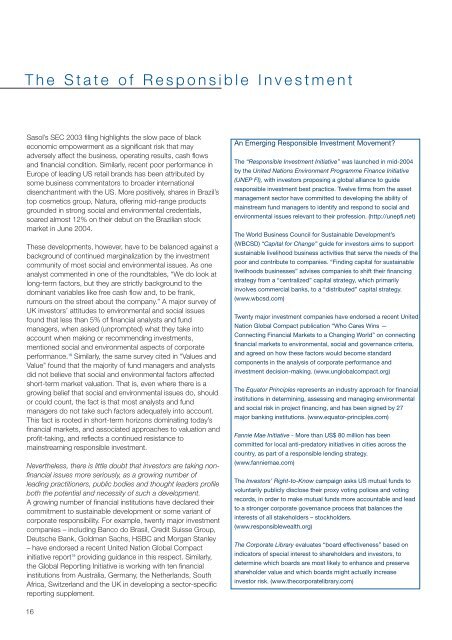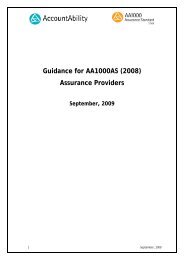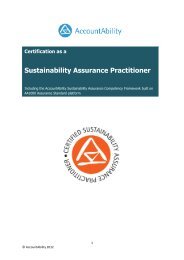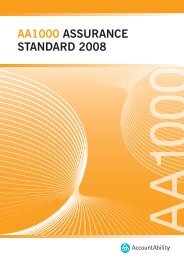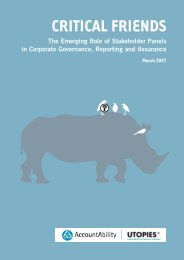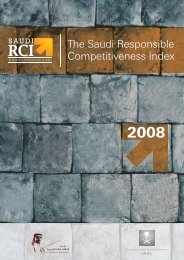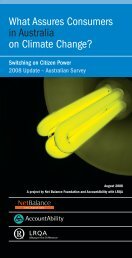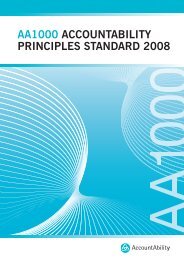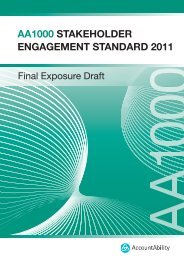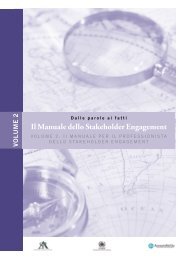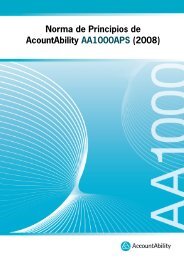Mainstreaming Responsible Investment - AccountAbility
Mainstreaming Responsible Investment - AccountAbility
Mainstreaming Responsible Investment - AccountAbility
Create successful ePaper yourself
Turn your PDF publications into a flip-book with our unique Google optimized e-Paper software.
The State of <strong>Responsible</strong> <strong>Investment</strong><br />
Sasol’s SEC 2003 filing highlights the slow pace of black<br />
economic empowerment as a significant risk that may<br />
adversely affect the business, operating results, cash flows<br />
and financial condition. Similarly, recent poor performance in<br />
Europe of leading US retail brands has been attributed by<br />
some business commentators to broader international<br />
disenchantment with the US. More positively, shares in Brazil’s<br />
top cosmetics group, Natura, offering mid-range products<br />
grounded in strong social and environmental credentials,<br />
soared almost 12% on their debut on the Brazilian stock<br />
market in June 2004.<br />
These developments, however, have to be balanced against a<br />
background of continued marginalization by the investment<br />
community of most social and environmental issues. As one<br />
analyst commented in one of the roundtables, “We do look at<br />
long-term factors, but they are strictly background to the<br />
dominant variables like free cash flow and, to be frank,<br />
rumours on the street about the company.” A major survey of<br />
UK investors’ attitudes to environmental and social issues<br />
found that less than 5% of financial analysts and fund<br />
managers, when asked (unprompted) what they take into<br />
account when making or recommending investments,<br />
mentioned social and environmental aspects of corporate<br />
performance. 18 Similarly, the same survey cited in “Values and<br />
Value” found that the majority of fund managers and analysts<br />
did not believe that social and environmental factors affected<br />
short-term market valuation. That is, even where there is a<br />
growing belief that social and environmental issues do, should<br />
or could count, the fact is that most analysts and fund<br />
managers do not take such factors adequately into account.<br />
This fact is rooted in short-term horizons dominating today’s<br />
financial markets, and associated approaches to valuation and<br />
profit-taking, and reflects a continued resistance to<br />
mainstreaming responsible investment.<br />
Nevertheless, there is little doubt that investors are taking nonfinancial<br />
issues more seriously, as a growing number of<br />
leading practitioners, public bodies and thought leaders profile<br />
both the potential and necessity of such a development.<br />
A growing number of financial institutions have declared their<br />
commitment to sustainable development or some variant of<br />
corporate responsibility. For example, twenty major investment<br />
companies – including Banco do Brasil, Credit Suisse Group,<br />
Deutsche Bank, Goldman Sachs, HSBC and Morgan Stanley<br />
– have endorsed a recent United Nation Global Compact<br />
initiative report 19 providing guidance in this respect. Similarly,<br />
the Global Reporting Initiative is working with ten financial<br />
institutions from Australia, Germany, the Netherlands, South<br />
Africa, Switzerland and the UK in developing a sector-specific<br />
reporting supplement.<br />
An Emerging <strong>Responsible</strong> <strong>Investment</strong> Movement<br />
The “<strong>Responsible</strong> <strong>Investment</strong> Initiative” was launched in mid-2004<br />
by the United Nations Environment Programme Finance Initiative<br />
(UNEP FI), with investors proposing a global alliance to guide<br />
responsible investment best practice. Twelve firms from the asset<br />
management sector have committed to developing the ability of<br />
mainstream fund managers to identify and respond to social and<br />
environmental issues relevant to their profession. (http://unepfi.net)<br />
The World Business Council for Sustainable Development’s<br />
(WBCSD) “Capital for Change” guide for investors aims to support<br />
sustainable livelihood business activities that serve the needs of the<br />
poor and contribute to companies. “Finding capital for sustainable<br />
livelihoods businesses” advises companies to shift their financing<br />
strategy from a “centralized” capital strategy, which primarily<br />
involves commercial banks, to a “distributed” capital strategy.<br />
(www.wbcsd.com)<br />
Twenty major investment companies have endorsed a recent United<br />
Nation Global Compact publication “Who Cares Wins —<br />
Connecting Financial Markets to a Changing World” on connecting<br />
financial markets to environmental, social and governance criteria,<br />
and agreed on how these factors would become standard<br />
components in the analysis of corporate performance and<br />
investment decision-making. (www.unglobalcompact.org)<br />
The Equator Principles represents an industry approach for financial<br />
institutions in determining, assessing and managing environmental<br />
and social risk in project financing, and has been signed by 27<br />
major banking institutions. (www.equator-principles.com)<br />
Fannie Mae Initiative - More than US$ 80 million has been<br />
committed for local anti-predatory initiatives in cities across the<br />
country, as part of a responsible lending strategy.<br />
(www.fanniemae.com)<br />
The Investors’ Right-to-Know campaign asks US mutual funds to<br />
voluntarily publicly disclose their proxy voting polices and voting<br />
records, in order to make mutual funds more accountable and lead<br />
to a stronger corporate governance process that balances the<br />
interests of all stakeholders – stockholders.<br />
(www.responsiblewealth.org)<br />
The Corporate Library evaluates “board effectiveness” based on<br />
indicators of special interest to shareholders and investors, to<br />
determine which boards are most likely to enhance and preserve<br />
shareholder value and which boards might actually increase<br />
investor risk. (www.thecorporatelibrary.com)<br />
16


